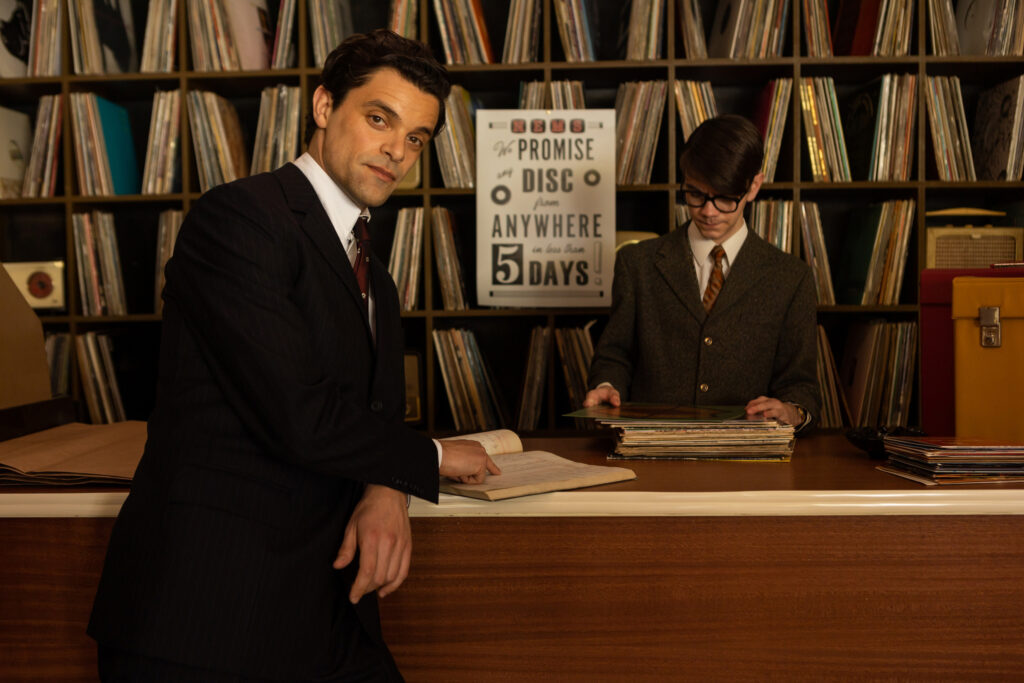Midas Man

In 1961, music business entrepreneur Brian Epstein visited Liverpool’s Cavern Club and was thrilled by a lunchtime set performed by four scruffy rockers dressed in black leather. It was the moment that Epstein’s life changed forever, so says the character playing Epstein in Joe Stephenson’s biopic, “Midas Man,” which was the opening-night film of the 20th Los Angeles Jewish Film Festival.
The movie traces how Epstein convinced the initially skeptical Fab Four to allow him to manage them, even though he had no previous experience managing bands — how he brought them to perform in New York, created their trademark look (think bowl haircuts), and vowed to make the band more famous than Elvis.
Along the way, the film depicts Epstein’s struggles with his homosexuality at a time when being gay was illegal. It also chronicles the alcohol and barbiturates he took to stave off his despair, and the beatings and blackmail he endured because of his sexuality.
There’s mention of his Jewish background as well. According to the movie’s co-writer, Brigit Grant, who is also the editor of the London-based Jewish News, Epstein was born on Yom Kippur. As a boy, he was bullied by anti-Semites. He had a Yiddish-speaking Lithuanian grandfather and a Jewish mother named Queenie (played in the film by Emily Watson). One early scene shows Epstein and his parents discussing his career aspirations in the family’s synagogue.
Actor Jacob Fortune-Lloyd, who plays Epstein, often breaks the fourth wall in order to address the moviegoer directly about the manager’s life and work. And because the filmmakers could not obtain the rights to any Beatles songs, they’ve substituted bands who have played cover versions of their music.
“Brian was always pushing, pushing, because the work, as it does for a lot of people, became a substitute for a happy personal life,” Grant said in a Zoom interview.
“One time he got hit with a broken bottle, and the guy went to prison,” she added. “And when he got out, Brian helped to find him a job.”

According to Grant, being semi-closeted was, for Epstein, “a constant agony he lived with,” she said. “He lived with the fact that he could be exposed in the media. It was a thing that hung over him. Brian always felt that he had to be proper; he had to be the grownup in the room, to not disappoint. I think that Jacob, the actor who plays Brian, also studied him and knew of that inner conflict: You’re not who you want to be, you’re something else, you’re pretending all the time, you’re putting on a different face. That’s one of the huge tragedies of his life.”
Front and center in the movie is Epstein’s relationship with the band members, who regard him as something of a big brother figure. “What Brian did was help to organize, shape, encourage and build their reputation,” Grant said. He also managed the band’s scandals with finesse. Grant knew who Epstein was when producers asked her to co-write the film. “I had been working with these producers on something else, and one day they said, ‘We just want to ask you, would you write the story of Brian Epstein as a movie for us?’ I was like, ‘Why? What makes you think it’s me?’ And they said, ‘You’ve got all the right elements for it. You’ve lived in New York and worked in publishing as an editor.’ One of my projects was gay pride, so I had that side of me, and then I am Jewish, and Brian was famously Jewish. They asked me to do it, and I just went with it. And then I loved him.”
Grant added that the producers had her write four treatments of the screenplay, “including every aspect of his life.”

When Epstein went on tour with the band, he’d seek out local synagogues in case he wanted to attend services. He was proud of his Jewish family and heritage. He refused to change his Jewish last name to something more palatable for international audiences.
“It’s famously said that Paul said to Brian, which isn’t in the film, that ‘My dad says you’re Jewish and good with money, and so we should go with you,’” Grant said. “It was, of course, a terrible thing to say, but people say far worse things now, don’t they?”
Grant explained that Epstein’s family was closely affiliated with a synagogue in Liverpool, and that he was bar mitzvahed there. “In fact, he was so good at Hebrew. They found out 10 days before his bar mitzvah that they had taught him the wrong Torah portion. And so he learned the new one. And according to his critical uncles, who were in the synagogue, he did it really well because he was a natural performer.”
As for how Grant portrayed Epstein’s Jewishness: “It very much stemmed from his family and how a Jewish family would deal with the first-born son, the son who would carry on the family name, the business and how that would impact them,” Grant said.
In 1967, after transforming the band members into international superstars and helping to launch the British invasion, Epstein died of an accidental overdose in his London home at the age of 32. The rabbi who eulogized him didn’t know him.

Grant hopes that “Midas Man” will help to reintroduce viewers to Epstein’s story. “I’d like people to realize how important he was in giving us the greatest band that ever was,” she said.
The 20th Los Angeles Jewish Film Festival ran from June 26 to July 1 at the Saban Theatre and Lumiere Music Hall in Beverly Hills, Laemmle movie theaters in Los Angeles and Encino, and at the Museum of Tolerance in Los Angeles. Besides “Midas Man,” festival highlights included the L.A. premiere of “Charles Grodin: Rebel with a Cause” and “Plunderer: The Life and Times of a Nazi Art Thief.”




























